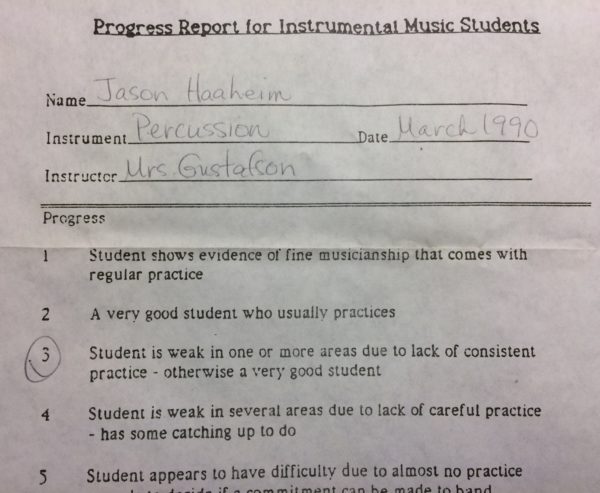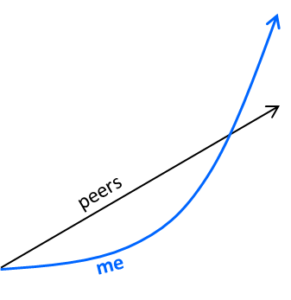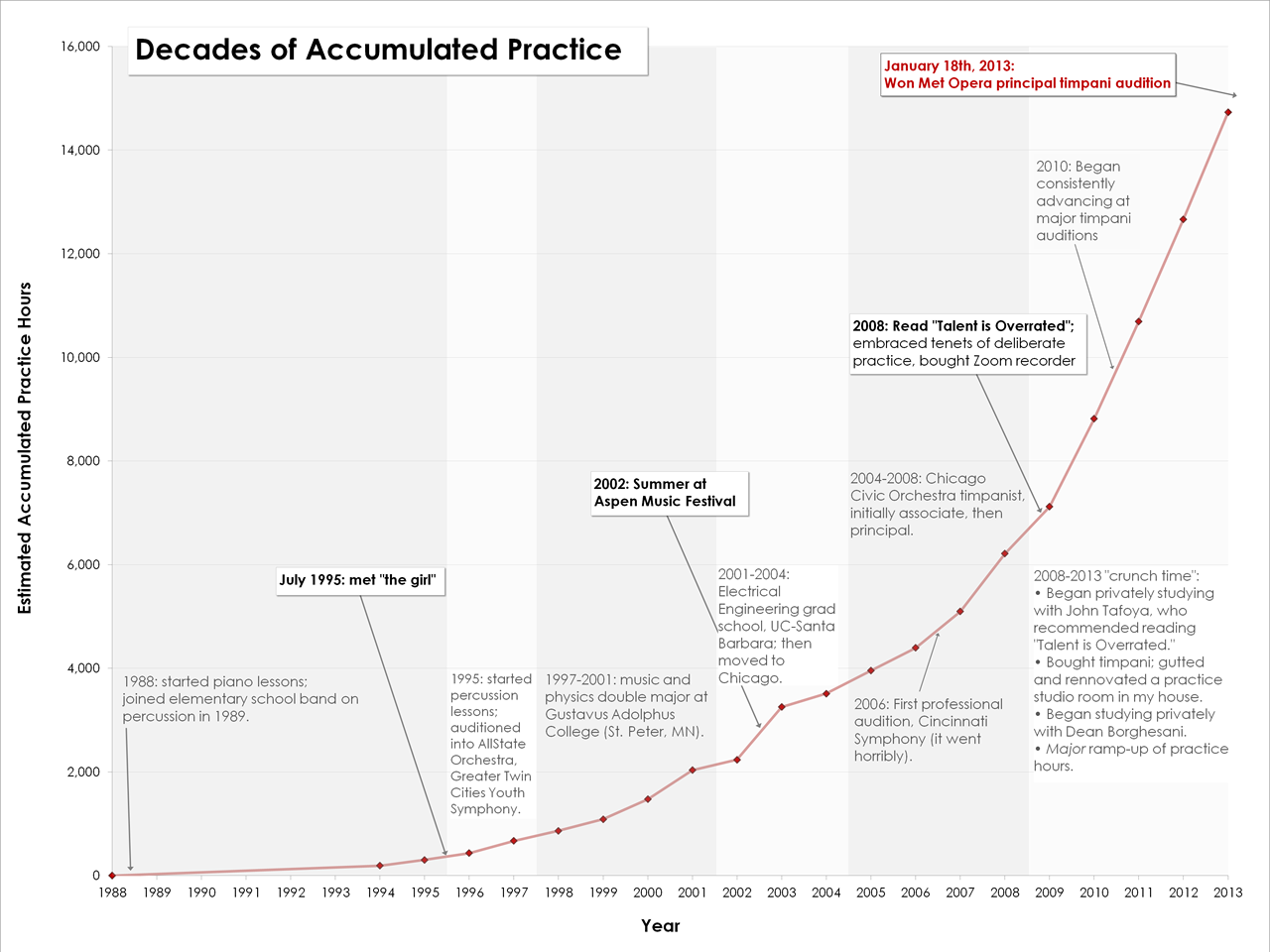I was not born talented at the timpani

To wit, there’s Mrs. Gustafson’s entirely accurate assessment. I was definitely weak due to lack of consistent practice. I was not a committed music student. This is partly because my entire career as a timpanist traces back to random occurrences. The first was in 1988: “Beverly Hills Cop” was in theaters, and for some reason my 4th grade music teacher created a version of its famous theme, “Axel F,” to play on his (then-brand new) Ensoniq synthesizer. I heard that tune and thought it was the coolest thing in the world. Neither of my parents were active musicians, but they did have one of those miniature Casio keyboards sitting around our condo. That same day, I got home from school and raced up to my room with that keyboard. A few hours later I reemerged, proclaiming to my parents, “Hey, check this out!” I’m pretty sure I proceeded to butcher Harold Faltermeyer’s catchy tune, but it was enough to prompt my folks to ask, “so…umm…do you want piano lessons?”
I did, but I was never a serious pianist. (I never got much further than Bach’s Two-Part Inventions.) However, playing piano did enable the next random occurrence: in our school district’s band program, you could only play percussion if you had been taking piano lessons. I was one of the few kids who’d been studying piano, and percussion seemed cooler than the alternatives.
And that was that. Random initiation, low commitment, and goofing around for at least the next 7 years. Here’s the point: I was not “good.” I wasn’t good in 5th grade. I wasn’t good in 8th grade. I wasn’t even really that good in college — at least not compared to my peers who were studying music seriously. (Around 1999, they were all kicking my ass.) Along the way, prominent teachers would have had every right to say “Jason’s not very talented.” But here’s the thing — I don't put much stock in “talent.” At least not the way most people think of it, and certainly not the way “talent” has been defined for centuries.
I need to address this head-on, because before we dive into the attributes of deliberate practice, we first need to be clear about what it isn’t. Deliberate practice has nothing to do with “talent.” For all intents and purposes, “talent” is irrelevant. The traditional notion of talent is dead.
That’s because the traditional notion of talent is that it's somehow innate; you’re “gifted,” and these gifts are genetic. All of this implies that you have some sort of fixed potential that you are trying to reach — some arbitrary ceiling on your progress with which you’ll ultimately collide. If your innate talent potential is low, you’ll collide with that ceiling early on, with influential teachers and mentors saying “sorry kid, ya just don’t have it.” Or if you’re lucky enough to be born with high potential, it will take much longer to collide with that ceiling…hopefully after you’ve “made it.” But the idea still remains: your inherent limitations are preordained, genetic, as fixed and immovable as the constellations in the night sky.
It’s also completely false garbage. It’s bunk. And finally, (finally!) after centuries of suffering under that false paradigm, scientific research is proving that the traditional notion of talent is nonsense.
Here’s the reality: your “potential” is scalable according to the time and effort you’re willing to put in. To quote Anders Ericsson, “the right sort of practice can help pretty much anyone improve in just about any area they choose to focus on. We can shape our own potential.”
I was NOT born with some innate gift for the timpani. As such, I didn’t (and don’t) have any specifically fixed potential. I was aiming not just to reach my potential but to build it, to change it, and to fundamentally alter my personal trajectory of “what’s possible.” Over time, I was able to do this because I embraced the tenets of deliberate practice. Eventually, I worked hard enough and smart enough for long enough that my rate of improvement grew dramatically. I had a late start, and I was definitely coming from behind…but I painstakingly pushed that trajectory higher and higher until it more than made up for my initial disadvantages.

That’s why I find myself saying this phrase to nearly every aspiring musician I encounter: “I don’t care how good you are — I care about the trajectory you’re willing to set.”
A Tale of Two Careers
It was the best of times, it was the worst of times…

…well, not really. That’s a bit hyperbolic. But in the intertwined and symbiotic courses of my science and music careers, there were definitely some good and bad times. Personal growth is never easy. Changing your trajectory is incredibly hard. But it is possible. And, like any journey, it will contain some defining moments — some inflection points.
So how did I go from an elementary school percussion slacker to principal timpanist of the MET Orchestra? What got me to focus on music more seriously?
It was a girl.
Seriously. I met her at summer camp. My buddy and I were goofing around on guitar and drums, and we decided to enter the camp's talent show. After we played we felt like heroes, and as I strutted out into the auditorium lobby I was approached by this girl. She came right up to me and said, “That was amazing. I saw you up there and just had to meet you. Wanna hang out?” <GULP> “Yeee-aaa-s” <voice cracks>.
As we got to know each other, I learned that she was a serious musician playing in the Greater Twin Cities Youth Symphony and the All-State Orchestra. At one point she asked, “so you must be auditioning for All-State too, right?” I stammered, “Oh…um…yeah…definitely!” (Note: I had no idea what she was talking about, and I’d accumulated exactly zero exposure to orchestral music.) Nevertheless, once I understood that the All-State Orchestra was Minnesota's best young musicians competitively auditioning for those spots, it dawned on me: “if I’m going to impress her and get into All-State, I should probably at least start taking percussion lessons.”
I found a teacher. I started amassing all the classical CDs I could get my hands on. I practiced my butt off. And I made it into All-State. Sure, the process was hormone-fueled, but I’ll never forget that first rehearsal: Tchaikovsky Romeo and Juliet. It was life-changing. I loved it. I was hooked.
The chart above continues telling the story. “The girl” was certainly a major inflection point; other inflection points would follow. Throughout college, and despite my love of music and orchestral playing, it just never seemed conceivable that I could actually become a professional orchestral musician. I would go to Minnesota Orchestra concerts, and to me those musicians were god-like figures, imbued with gifts I could never hope for and didn’t feel I possessed. So I proceeded through my undergraduate studies double majoring in music and physics, knowing I loved music, but conceding that a science career would be more realistic and achievable. Science and music were intertwined, but not yet symbiotic for me.
UC Santa Barbara has a world-class electrical engineering program. They made a generous fellowship offer, and so it was off to California for grad school. Two things happened during that time: first, I realized that while I could do the science thing (and that I was reasonably good at it), I didn’t love it. Second, I hit my next inflection point — a summer studying at the Aspen Music Festival, doing the thing I actually loved. Critically, I began to see orchestral musicians from around the country as real people, immensely skilled and accomplished artists…but real people. It was the first time I started questioning that “pedestal” and the innate god-like nature of their talents. That summer planted a seed that never went away: “if they can do it, then maybe I can too….”
After returning from Aspen, passing my requisite exams, and earning my master’s degree in electrical engineering, I ended up with a compelling job offer from a nanotechnology startup company in Chicago. I knew that would be a good move because (a) I had a lot of good friends there, and (b) Chicago is home to the Civic Orchestra, the training orchestra of the Chicago Symphony.
I sought out teachers. I juggled a full time engineering job and a musician’s practice schedule. (Those pressures definitely produced some “worst of times.”) I practiced my butt off. And I ultimately auditioned into Civic, first as associate timpanist, and then in 2006 as principal timpanist. By that point, I had decided “I want to be a professional timpanist, I want to switch careers.” I knew it would be difficult; I had no idea how gruelling and painstaking it would actually be over so much time. But I was committed.
My third inflection point was starting to work with John Tafoya, particularly when he recommended that I read a book that had just come out called Talent is Overrated. I read it, and it was life-changing. (I’ll detail this and other relevant books in my next post.) I embraced the tenets of deliberate practice, taking my arsenal of scientific process understanding and aiming it squarely at my musical self-improvement. I reveled in the science/music symbiosis. I started recording myself obsessively. I created a sophisticated archive system for logging my practice notes, recordings, and musical decisions. And I started getting much better much more quickly.
Now, I’m glossing over a lot of details in this story, but that’s because I want to focus on those critical inflection points — the ones that really impacted my trajectory. I’ve been accumulating practice hours for a long time, but practice time from my early years in no way resembled “deliberate practice.” It was casual, uncommitted “vanilla practice.” It barely counted. It wasn’t effective. It took many, many years for me to figure out what practicing really meant; once I did, my trajectory improved dramatically. Specifically, the efficacy of those practice hours made them truly count. The shape of the curve in the chart above — the massive upswing of my trajectory — tells the most important story, and testifies to the power of deliberate practice.
It’s a power that spans the gulf of perception and time. When I was a kid, a life as a musician never seemed like it could be real. That life was perched on that illusory pedestal, seeming completely removed and inaccessible to mere mortals. But I couldn’t have been more wrong. There’s a continuous line from that uncommitted slacker to present-day me. The privilege of being principal timpanist of the MET Orchestra — this career at the apex of the arts in America — was and is accessible to a kid of modest means who wasn’t particularly remarkable as a 4th grade musician. It’s accessible because everyone’s potential is scalable. No one sprinkled “timpani dust” on me. This is not something I was born with. I grew it, cultivating it and scaling my potential over a long time, and through lots and LOTS of failure. For many years, I was a tenacious loser.
I remained a mediocre musician until I decided to invest the time and energy to radically alter my trajectory. Once I started applying deliberate practice in a committed way, I accomplished more in the next 3 years than I had in the preceding 20. So if you’re reading this thinking “yeah, but I’m just not very good,” I’m going to be blunt: shut up. I don’t care how good you are right now — I care about the trajectory you’re willing to set. I care about how good you’re willing to become, and I care about how much time and energy you’re willing to put into it.
“I’m-not-good-enough-ism” is a disease that plagues (and has plagued) so many musicians. It’s fine and necessary to critique yourself, but it should always remain constructive. Don’t let it metastasize into an indictment of your potential; that’s a tragic waste, and entirely counterproductive. Your potential is up to you.
If I could, the question I would have all music students ask themselves is not “am I good enough right now?” but rather “am I willing to do the work?” The focus and intensity of that work will determine your trajectory, and that is by far the most important thing.
![]()
